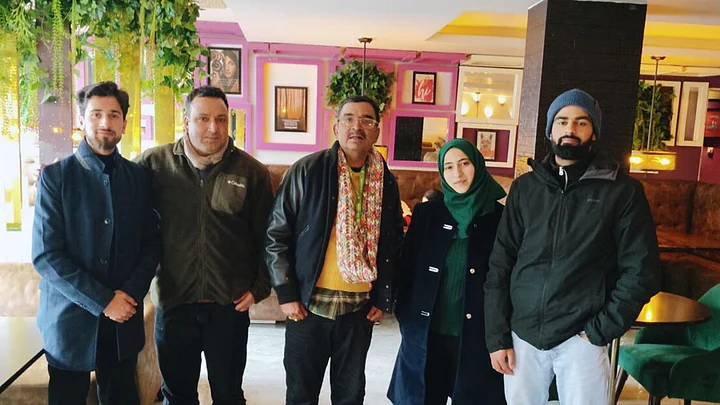(This is the eighth in a series of insightful reports from the ground, titled The Race From India to Bharat. The author travels all across India as 960 million voters get ready to celebrate the largest festival of democracy in the world: the 2024 Lok Sabha elections. What do ordinary Indians think and feel about the past, present, and future of India? Are they convinced that the old fault lines are healing?)
(Read part one here, part two here, part three here, part four here, part five here, part six here, and part seven here.)
It’s a shade over zero degrees in downtown Srinagar where the author interacts informally with Suman and a few others who are students at Amar Singh College. What impresses the author is her personality. She radiates confidence. Suman Lone does take time to choose her words but is remarkably articulate for her age. Within a few minutes of our conversation, the author starts admiring her. After another 15 minutes or so, the author also has a tinge of worry for her.
Why so? First, let's deal with the admiration bit. Suman has no hesitation in stating what she would demand from Prime Minister Narendra Modi (who is visiting Srinagar on 7 March) if she gets an opportunity to meet him. “My demands would be straightforward. Restoration of statehood, elections, a rethink about the demarcation of constituencies, employment specifically in the government sector, deployment of local high officials in administration and police, freedom of press and freedom to protest to government employees and unions”.
According to her and dozens of other Kashmiris the author talked to, the absence of an elected government and the culture of “outsiders” being sent from Delhi has led to frustration among locals as the “para dropped” officials often have no experience in dealing with socio-economic issues in Kashmir. The author pondered for a moment about how the impressionable youth in Maharashtra, Tamil Nadu, Odisha, Madhya Pradesh and other states have the exact set of demands.
Do remember, Jammu and Kashmir has not seen an elected government or assembly elections since 2018. Besides, when Article 370 was abrogated on 5 August 2019, the state of Jammu and Kashmir was divided into two separate union territories: Ladakh and J&K. No sensible Indian would be opposed to such demands. Just imagine: how would people in Assam or Punjab react if they were converted into union territories and ruled directly from Delhi without elections for six years?
Then why is the author worried about Suman? For some reason, after about 15 minutes of conversation, Suman, Sajid, Haziq and Sayeed sensed that the author was a realist and not some chest-thumping jingoist who had flown down from Delhi to hector them. Inevitably, the conversation drifted towards the future of Kashmir.
Sajid is earnest and optimistic. He thinks that there could be a bright future for Kashmiris like him if the regime in Delhi genuinely pays attention to local aspirations and respects their identity. Suman is more cynical. “What future can we think of? We have become silent witnesses to all that is happening here. Even government employees have to toe the line.” Sensing her cynicism, despite the chirpy smile, the author suggested that Suman should forget about any notions of azadi as China would gobble up Kashmir in a jiffy if India accepted the separatist demand of azadi.
Smiling ruefully, Suman responds by saying that this is not the age of idealism for the youth. “I remember reading something Maqbool Bhat had written one ago about how independence or even autonomy will never be possible without economic strength. I think he was right.” That triggered my worry for Suman who is only 23 years old.
Maqbool Bhat was a co-founder of the Jammu and Kashmir Liberation Front who wanted independence from India. He had been sentenced to death for his separatist and terrorist activities. In early February 1984, some radicals kidnapped diplomat M H Mhatre in Birmingham (in the UK) and killed him in the name of a “free Kashmir”. Within days, the Indira Gandhi government hanged Bhat.
That the 23-year-old Suman would read, follow and remember Maqbool is not surprising per se. Bhindrawale, Prabhakaran (LTTE), Veerappan, Dawood Ibrahim and many others still have fan followings. But the author was concerned about Suman thinking that what Maqbool wanted may be impossible, but still a dream worth dreaming.
Suman could go either way. Become a successful professional who advocates the cause of Kashmir as an Indian. Or she could become a bitter and disillusioned Kashmiri like so many others.
Back in Delhi, the author thought deeply about this. What can Delhi do to transform the cynicism of Suman to at least cautious optimism? The author is no expert on this issue. Nor is there enough space to write in elaborate detail. But even “small” gestures can make a difference to the project of emotionally integrating Kashmiris.
For instance, the author reads and listens to a lot of hype over massive infrastructure investments in Kashmir. A lot of the hype is grounded in realities. But not all. In villages around Anantnag where the author went, power cuts were routine for about 12 hours a day, according to the locals. The author stayed in a “premium houseboat” at Dal Lake and got up early morning to write down notes on his pan-Indian travel. There was a power cut at 5 AM and I was forced to shake the caretaker up to switch on the power back up at 5.30 so that the coffee machine could work.
Surely, a regular electricity supply can be a small but significant step to convince Suman that Delhi cares.
